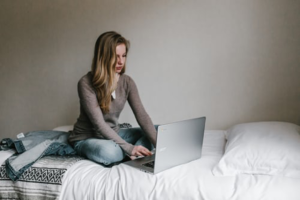
How have you and your family been dealing with the new stay-at-home restrictions? Even if you’re fortunate enough not to be sick or on the front lines, you’re likely to be impacted.
Working remotely with kids at home, missing out on highly anticipated events, and even just being shoulder-to-shoulder with our partners 24/7 can cause unexpected feelings of frustration, sadness, or even anger. There are many other ways in which we have all been affected and the stress can be very difficult to handle.
Below are some particular challenges that may come up due to COVID-19 stressors. If you’re facing these issues or something similar, call us at 949.528.6300. We’ll be happy to match you with a skilled, compassionate provider for online counseling support.
Addiction management
Being isolated at home creates unique challenges for those managing addiction or compulsive behaviors, whether it be alcohol, drugs, binge eating, or anything else. The temptation to temporarily abandon your goals can be strong, especially if you are living alone or are experiencing tension within your family. Online counseling can be your lifeline in these situations.
Work/life balance
A lot of us had grand plans for how we’d use the extra time we normally spent commuting — maybe we’d have time to cook breakfast, or get a little yoga practice in at the start of the day. But of course, once you start checking emails, it’s over. Suddenly, you’re at your laptop at 7 a.m. — because your “office” is just three feet away — and you fill those extra hours with more work. Even after your regular day is over, it’s easy to keep working a little longer since you have nowhere else to go!
On the flip side, having children at home can make it especially harder to be productive from 9 to 5, pushing many people to work odd hours. According to one report, more U.S. workers have been logging into their computers after midnight since the coronavirus shutdown, and they are generally working three hours longer per day.
All of this is a recipe for exhaustion. An online therapist can be quite effective at helping you to set limits and boundaries, combat negative self-talk, and ask for help in managing work and household demands.
Relationship issues
Particularly fragile relationships can be even more difficult right now, since it is not easy to “escape” when you are sheltering at home together. You and your partner used to spend most of your days apart while at work or involved in personal activities, but now you’re together all day long. Not only that, but additional stressors, such as sudden unemployment, financial changes, or fears of getting sick, can make both of you extra sensitive, leading to arguments and resentment. An experienced couples therapist can help you safely express your respective feelings and needs, and provide tools for setting boundaries and managing conflicts.
When your partner is actually abusive or suffers from a personality disorder (narcissism, borderline personality disorder, etc.) things become even more difficult. A trusted therapist who can reach you in the privacy of your home can help you navigate these situations and, if necessary, assist with emergency resources.
Teen frustrations
Stay-at-home orders are especially hard for many teens. At this age, they have a psychological need to start separating from their families in order to form their own identities. Maintaining outside friendships and a sense of freedom are both critically important at this developmental stage.
When they can’t do that, it is extremely stressful for them. What’s worse, they don’t yet have the resilience or coping skills that come from life experience. Our therapists, some who specialize in youth, can help by supporting you through advice and parenting techniques, your teen through individual counseling, or both of you through family therapy.
Existing disorders
Fears of contamination can trigger tendencies toward obsessive-compulsive disorder (OCD). Suddenly, what was previously thought of as an “irrational” fear has become a real concern. Similarly, recommendations such as increased hand-washing can reinforce compulsive behavior.
If you suffer from panic or generalized anxiety disorder, the fear of the virus can lead to excessive worry about yourself or your loved ones. You might constantly read news about the virus or feel hypervigilant.
If you feel the coronavirus has negatively impacted your ability to manage an existing disorder, you might want to reach out for additional support.
No doubt, COVID-19 has created unique challenges for many of us. The providers at Orange County Health Psychologists offer online counseling for those struggling with circumstances either directly or indirectly related to the COVID-19 outbreak. Call us at 949.528.6300 or send an email to info@OCHealthPsych.com for more information.
—Written by Ekua Hagan for Orange County Health Psychologists


It helped when you mentioned that you might want to reach out for assistance if you feel that this pandemic has negatively impacted your mental health. A friend of mine mentioned to me last night about having mental health consultation because of depression and asked if I have any idea what is the best option to do. Thanks to this informative article and I’ll be sure to tell him that it will be much better if he consults a trusted psychotherapist as they offer virtual therapy sessions as they can answer all his inquiries and will provide proper treatment.